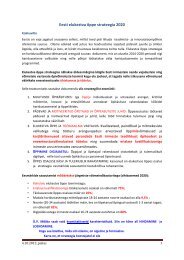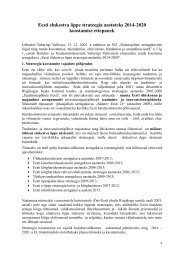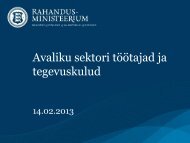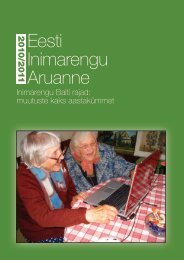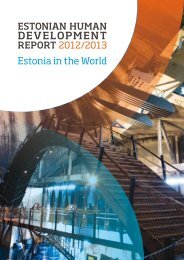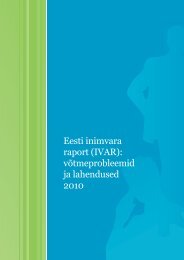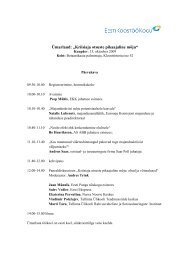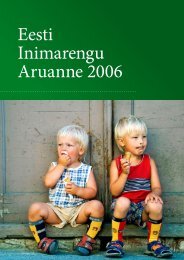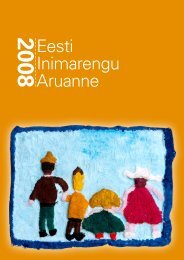Estonian Human Development Report
Estonian Human Development Report - Eesti Koostöö Kogu
Estonian Human Development Report - Eesti Koostöö Kogu
Create successful ePaper yourself
Turn your PDF publications into a flip-book with our unique Google optimized e-Paper software.
elated to economic factors than among the indigenous<br />
population. In light of this, the current economic crisis is<br />
likely to add momentum to the spread of distrust among<br />
the Russian-speaking population.<br />
Trust in institutions<br />
In young Eastern European democracies, democratically<br />
elected institutions, or those that directly represent the<br />
people, such as the parliament and the political parties,<br />
are generally trusted the least. At the same time, institutions<br />
and power structures that are removed from the<br />
fray of everyday politics and play a greater representative<br />
and symbolic role (such as the president and the military),<br />
enjoy a notably higher level of trust. The results of the New<br />
Baltic Barometer surveys from 1993–2004 show that in the<br />
Baltic countries, trust in political parties was already very<br />
low (around 10–15 per cent) in 1993. However, trust in the<br />
parliament has decreased with time – about half the population<br />
in the Baltic countries trusted the parliament in<br />
1993, while less than 20% did so in 2004 (Ehin 2007).<br />
In 2008, the Riigikogu continued to be the least trusted<br />
institution in the eyes of the <strong>Estonian</strong> public. In the spring<br />
of 2008, only a quarter of ethnic <strong>Estonian</strong>s trusted the parliament;<br />
at the same time, 67 per cent trusted the president<br />
and 37 per cent trusted the government (Figure 4.4.1.). The<br />
attitudes of the Russian-speaking population are characterized<br />
by extremely low trust in the principal state institutions:<br />
in the spring of 2008, the Riigikogu was trusted<br />
by only a tenth of the Russian-speakers; and only 13% of<br />
the respondents considered the government and the president<br />
to be trustworthy. However, among Russian-speaking<br />
young people (aged 15–29), the perceived trustworthiness<br />
of the parliament, government and president is<br />
almost twice as high as among older people (aged 50–74).<br />
Political participation<br />
Democracy cannot survive without the readiness of the citizens<br />
to participate in politics. Voter turnout at elections has<br />
decreased during the independence period both here and in<br />
the neighbouring countries. In the first parliamentary elections<br />
after the restoration of independence 68% of voters in<br />
Estonia, 90% in Latvia, and 75% in Lithuania participated,<br />
while during the most recent elections the participation rate<br />
was only 62% in Estonia, 61% in Latvia and 49% in Lithuania.<br />
A comparison with other European Union countries<br />
shows that voter turnout in parliamentary elections in Estonia<br />
is significantly lower than the European Union average<br />
(70.4%), but is generally at the same level as in the other<br />
Eastern European democracies (International Institute for<br />
Democracy and Electoral Assistance 2008).<br />
Political parties play in important role in representative<br />
democracy, linking the people and the decision-makers.<br />
A low level of trust in political parties and the lack of<br />
stable partisan preferences are typical of Estonia (and post-<br />
Communist democracies in general). According to the<br />
findings of the 2008 study (State Chancellery 2008b), 36%<br />
of <strong>Estonian</strong>s do not feel close to any political party; among<br />
the Russian-speaking population, half of the respondents<br />
(49.5%) are of the same opinion. Although Estonia has, relative<br />
to the population, a larger number of nongovernmental<br />
organizations than other post-Communist countries,<br />
participation in the activities of nongovernmental organizations<br />
is significantly more widespread among <strong>Estonian</strong>s<br />
Table 4.4.2. Trust in the <strong>Estonian</strong> state<br />
Stateless<br />
Russianspeaking<br />
population:<br />
<strong>Estonian</strong>s:<br />
All<br />
Citizenship<br />
<strong>Estonian</strong><br />
Russian<br />
Age<br />
15–29 30–49 50–74<br />
trusts 23 23 27 20 24 22 22<br />
does<br />
not trust<br />
39 40 33 43 45 38 38<br />
trusts 61 * * * 71 60 53<br />
does<br />
not trust<br />
11 * * * 6 6 11<br />
Source: Integration of <strong>Estonian</strong> Society: Monitoring 2008<br />
Figure 4.4.1. Trust in institutions in Estonia<br />
Riigikogu<br />
Church<br />
Government<br />
Local<br />
government<br />
Judicial<br />
system<br />
Banks<br />
Police<br />
President<br />
10<br />
13<br />
13<br />
13<br />
25<br />
27<br />
31<br />
0 10 20 30 40 50 60 70<br />
37<br />
37<br />
Russian-speaking population<br />
Source: Integration of <strong>Estonian</strong> Society: Monitoring 2008<br />
45<br />
46<br />
48<br />
50<br />
56<br />
62<br />
<strong>Estonian</strong>s<br />
than among the Russian-speaking population (<strong>Estonian</strong><br />
<strong>Human</strong> <strong>Development</strong> <strong>Report</strong> 2007 Chapter 2.2.).<br />
People whose native language is Russian believe that<br />
they have far more limited opportunities than ethnic<br />
<strong>Estonian</strong>s to be engaged in politics, to influence local-level<br />
decision-making and to participate in the activities of<br />
nongovernmental organizations. Among Russian-speaking<br />
respondents, 90% considered <strong>Estonian</strong>s to have considerably<br />
greater opportunities for political activity compared<br />
to members of ethnic minorities, and half of the<br />
respondents found that it is easier for <strong>Estonian</strong>s to participate<br />
in the work of nongovernmental organizations.<br />
Ethnic differences are also evident in people’s assessment<br />
of their political efficacy. As many as 42% of ethnic <strong>Estonian</strong>s,<br />
but only 25% of Russian-speakers agree with the statement:<br />
“The course of events in the country depends on the<br />
choices of the people, including myself and people like me”.<br />
There are no significant differences in the self-assessed political<br />
competence of different ethnic groups. Of <strong>Estonian</strong>s, 28%,<br />
and of the Russian-speaking population, 26% agree with the<br />
statement: “I think that I am sufficiently competent in political<br />
matters that my positions could be of interest to others.”<br />
Greater political confidence is evident among Russian-speaking<br />
<strong>Estonian</strong> citizens and younger age groups (Table 4.4.3.).<br />
In examining how people assess the various channels<br />
of influencing society and politics, it is useful to distinguish<br />
respondents by ethnicity, citizenship and age (Table<br />
4.4.4.). <strong>Estonian</strong>s place considerably more importance on<br />
voting and participating in the activities of nongovernmen-<br />
67<br />
93 |



